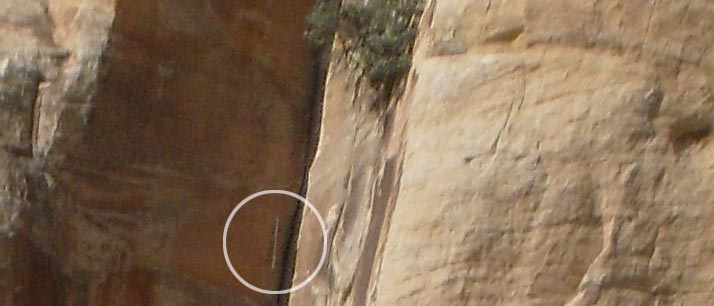Web of Intrigue
Connections to the Rock
by Larry DeAngelo
After a few decades of climbing, you can start to focus on some odd areas of the activity. Take webbing. In my mind the different webbing styles each characterized different eras. The sixties were white one-inch tubular. The seventies were still one-inch tubular, but now in the bold primary colors. By the time the eighties came along, we were seeing rainbow weaves and fluorescent hues. Things wandered out of my zone of focus after that as manufactured quickdraws and sewn kevlar became popular.

Webbing colors circa 1970.
As a California teenager, I got into climbing at the very end of the sixties. Bright purple Chouinard one-inch was my first swami. The established heroes of the day were all from the white webbing era: Robbins and Pratt, Kamps and Higgins, and all the names in the Yosemite guidebook. The rising stars would be from the bold-primary decade: Long and Bachar and a dozen other Stonemasters who routinely did the impossible. I didn't pay much attention to the fluorescent cohort; even though these kids were climbing insanely hard stuff, they still seemed like kids. And besides, a lot of their climbing didn't really seem like the sport I had started in.
These days, Red Rock is home. I've already done most of the recorded routes within my abilities, so I spend my time wandering around, occasionally putting up a new line, sometimes stumbling onto a forgotten route from those hazy decades of the golden age. This turns out to be a "can't lose" proposition. You get either the satisfaction of the FA, or the pleasure of uncovering a hidden gem with its accompanying sense of connection to the area's history. Both are great.

A good-looking corner.
On one ramble I came across a good-looking corner. It was clean, steep, and maybe even within my abilities. After a while I badgered someone into making the hike to go check it out. Paul packed the gear, planning for the stellar handcrack I had described. Paul's wife, Diane, came along to enjoy the hike. I brought a rope.
The approach feels longer than I remembered, but the corner looks just as good. We rack up and start climbing. The first thing I notice is that the crack is more difficult than it looked. The second thing is that there is very little handcrack in the corner-- mostly fists and wider. The bad thing about this is that we have very little gear of suitable size. By the time I have climbed fifty feet, I am out of the big gear. I reach a spot that takes smaller stuff, so I string together a few cams and set up a hanging belay.
Paul comes up and leads through. The corner continues to pose its challenges. The sustained nature of the climbing leads us to joke that if you are moving it is 5.8; if it feels like a crux, it is 5.9; and if it is a rest spot, it is 5.7. Now, before you go saying that sounds like pleasant moderate romp, let me remind you that I am psychologically attached to the white webbing decade, where 5.7 was hard, and 5.9 represented a very serious effort. Paul's pitch continues with the same flavor. But then he has some bad news. After passing a small bulge, he has a better view of the upper part of the corner. Some distance above him, the crack withers away, leaving just a lichen-speckled water streak. This doesn't sound so good. I can't really see what it looks like, so I'm pretty open to Paul's suggestions. He doesn't like it at all. He mentions that there is a sloping ledge above, and in his pack at the base he happens to have a drill. We could drop a rope to Diane, haul up the bolt kit, and bail from the sloping ledge.
I'm a difficult soul, maybe even a little obstinate. The bolt idea is out of the question. Won't even consider it. If we have to bail, we at least bail like men, even if it costs a cam or two. But there is no way we are drilling here. So Paul sets up another hanging belay and brings me up to survey the situation for myself.

Skin was invested.
Yup, the crack vanishes. That would be a problem to those unafflicted with pathological optimism. I figure it is worth taking a closer look. We've got too much skin invested in the hundred feet we have climbed so far. Can't just give up. Besides, there is a faint whisper of hope. There is a bush growing from a crack about ten feet to the right of the corner. As that crack descends below the bush, it narrows to a barely visible RURP seam, and this occurs at just about the height at which the corner crack disappears.
I lead up the corner and traverse a few delicate steps to a tiny perch at the base of the RURP crack. The generally useless seam in front of me offers one gift: a small pocket wide enough for a cam. A short distance above, the seam widens abruptly to a body-height, offwidth pod with the bush growing from its top. It looks like a few thin friction moves will take me to the pod. There is one minor problem: the pod is absolutely packed to the lip with 170 bushels of vicious scrub oak leaves accumulated over the last few centuries. I balance up the precarious friction until I can reach the pod. Desperately I dig into the pointy, hostile debris. I scoop madly, hoping to uncover a good hold. Nothing! The holly-like leaves are everywhere: in my shirt, on my face, in my mouth. Still no hold. Can't hang here much longer, got to go for the move! I try to step up, but the only friction patch is covered with my recently excavated dirt and leaf fragments. So I am airborne.
Mercifully, the cam holds, sparing me a dramatic swing back into the corner. I regroup on the RURP perch, and dust off myself and all the friction ripples I can reach. That was no fun. After a bit of soul-searching, I try again. I tiptoe upward, cleaning the holds as best as I can. The bottom of the pod is now mostly clean, so I launch into it. I'm using every trick in the book to stick in the flaring pod, but mostly it boils down to burrowing into the remaining debris and squirming with psychotic intensity. I fling an arm up and latch onto the bush! Yes! I pull up, wrap a sling around the trunk, and clip in.
Euphoria sets in. My God, that was great! That was serious! That's as old-school as it gets! Oh yeah! Even Robbins would have been proud of that one! I'm so high I'd have to rappel to be on Cloud Nine! Man, I was pressed hard, but I held it together! And an FA, too! Hard core! It doesn't get better than this.
Except for one thing. I start digging the rest of the leaves out of the top of the pod, and it's not an FA. Buried in the debris, there is a fluorescent pink rap sling lower on the bush. Fluorescent pink! Noooooo! How could it be? This was supposed to be old-school. It just not right to crush a man's spirit when he's flying so high. Pink? How can pink be hard core? No FA, not even a connection to the heroes of my younger days. Just doesn't seem right.

Color choices expanded in the 1980s.
Sometimes climbing can be that kind of a roller coaster.
Well, can't stay up here forever. Better set up a new rap anchor. I move the pink sling out of the way and . . . Wait! It's not pink! It's red! It's been up here so long that it got bleached to pink even with all the leaves covering it. Wow, that's an old sling! Red puts it back in the primary color webbing time slot. I knew it! Back when men were men. This might have belonged to one of the masters, maybe Joe Herbst or Mark Moore. Maybe Richard Harrison. That's hard core! I told you you this was serious old school!

The bush and the bolt.
Epilogue: I was back a few years later, and someone has placed a bail bolt at the sloping ledge. Now the route is even in the new guidebook (see Rockingstone Groove). So, the climb has been a little sanitized, and a little connection to the past has begun to evaporate. Time has this way of marching on, and I am grateful I had the chance to grasp and savor it when I did.

